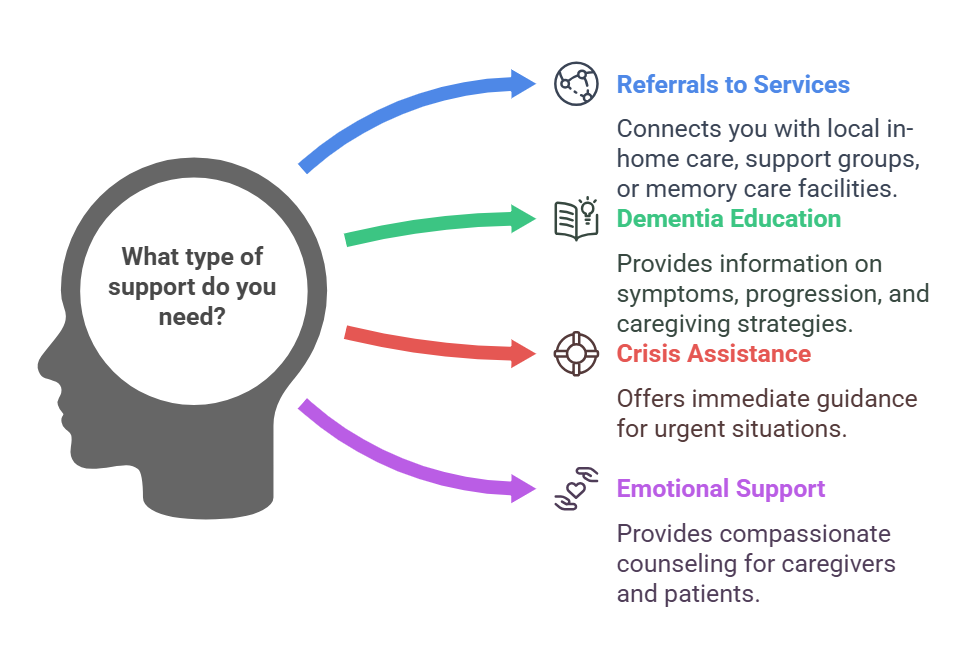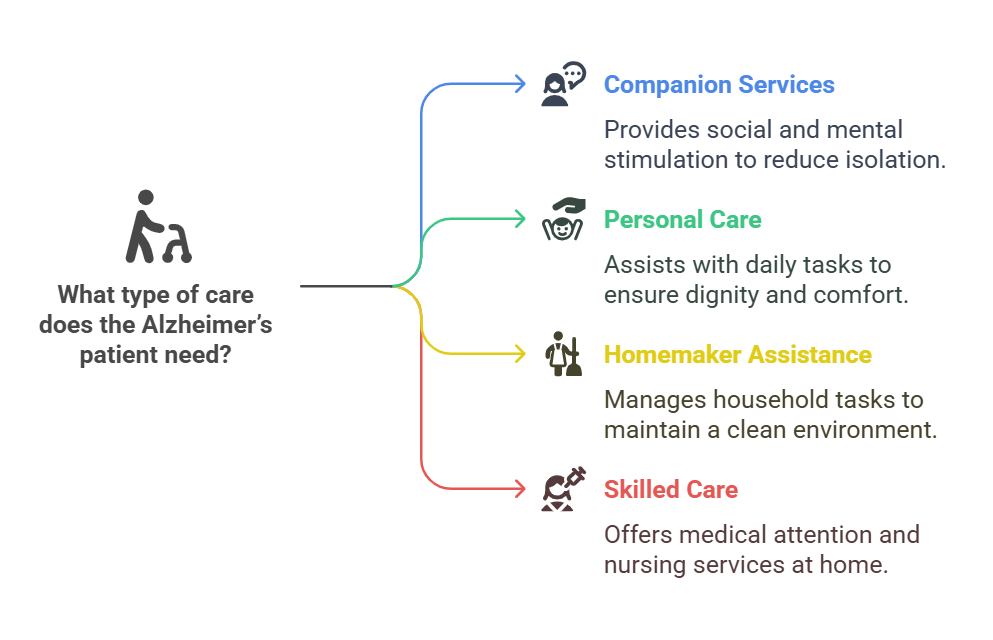What Specific Services Are Provided for Patients with Alzheimer’s Disease?
Alzheimer’s disease isn’t just about memory loss, it’s a progressive condition that affects nearly every aspect of a person’s life. From difficulty recognizing loved ones to struggling with basic daily tasks, the challenges can be overwhelming.
That’s why specialized services exist to ease the burden and improve the quality of life for both patients and their families. Whether it’s round-the-clock helpline support, in-home care, or memory care facilities, these services provide essential guidance, relief, and structured care. Some offer emotional support, while others focus on medical and personal assistance. Together, they create a network of resources that help families navigate the complex journey of Alzheimer’s with dignity and compassion.
24/7 Helpline Support
Caring for someone with Alzheimer’s can feel isolating, but help is always just a phone call away. The Alzheimer’s Association 24/7 Helpline (800.272.3900) is a lifeline for patients, caregivers, and families, offering round-the-clock support from trained professionals. Whether it’s 2 a.m. and you’re dealing with an unexpected crisis or you just need advice on local care options, the helpline provides reliable information, guidance, and reassurance anytime, day or night.
So, what exactly does this service offer?
- Referrals to local programs and services – Need in-home care, a support group, or a memory care facility? The helpline connects you with trusted resources in your area.
- Dementia-related education – Learn about symptoms, disease progression, and caregiving strategies. Knowledge is power, especially when dealing with a condition as complex as Alzheimer’s.
- Crisis assistance – If an urgent situation arises, trained professionals provide immediate guidance to help you manage the situation safely.
- Emotional support – Sometimes, you just need someone who understands. Whether you’re a caregiver struggling with stress or a newly diagnosed patient feeling uncertain, compassionate counselors are ready to listen.

In-Home Care Services
For many individuals with Alzheimer’s, staying in a familiar environment can make all the difference. Home is more than just a place, it’s comfort, routine, and a source of stability. In-home care services like those offered by Isaiah Home Health care allow patients to receive the support they need while remaining in a setting that feels safe and familiar. This can reduce confusion, ease anxiety, and help maintain a sense of independence for as long as possible.
There’s no one-size-fits-all approach to in-home care, which is why services are tailored to individual needs. Here’s how they break down:
- Companion Services – Alzheimer’s can be an isolating disease, but companionship can help. Caregivers provide supervision, engage in recreational activities, and offer friendly conversation, helping to keep patients socially and mentally stimulated.
- Personal Care – As the disease progresses, daily tasks become harder. Caregivers assist with bathing, dressing, toileting, eating, and even gentle exercise, ensuring dignity and comfort.
- Homemaker Assistance – Simple chores can become overwhelming for Alzheimer’s patients. In-home aides help with housekeeping, grocery shopping, meal preparation, and other household tasks, keeping the environment clean and manageable.
- Skilled Care – Some patients require medical attention beyond basic assistance. Licensed professionals provide wound care, injections, physical therapy, and other nursing services—all within the comfort of home.

Support Groups and Counseling
Alzheimer’s doesn’t just affect the person diagnosed, it also impacts their loved ones as well. The emotional and psychological toll can be overwhelming, leaving both patients and caregivers feeling isolated, anxious, or even burned out. That’s why support groups and counseling services are so essential. They provide a lifeline of understanding, guidance, and emotional relief during an incredibly challenging journey.
A Safe Space for Connection
Support groups, whether in-person or online, offer a chance to connect with others going through similar experiences. For caregivers, this means a space to share frustrations, celebrate small victories, and gain practical advice from those who truly understand. For patients, it’s an opportunity to maintain social connections and feel less alone in their diagnosis. Options include:
- Face-to-face support groups – Hosted by local organizations, these meetings create a welcoming environment for open discussions and emotional support.
- Online communities (like ALZConnected®) – Virtual platforms allow individuals to seek advice, share experiences, and find encouragement from others, no matter where they are.
Professional Counseling for Emotional Well-being
Sometimes, talking to a trained professional can make all the difference. Counseling services, often led by social workers or therapists specializing in dementia care, help patients and caregivers navigate:
- The emotional weight of an Alzheimer’s diagnosis
- Strategies for managing stress, anxiety, and depression
- Coping mechanisms for difficult behavioral changes in loved ones
- Decision-making about long-term care options
Having a strong support system isn’t just helpful, it’s necessary. Whether through group discussions or one-on-one therapy, these services provide an essential emotional anchor, ensuring that no one has to face the challenges of Alzheimer’s alone.
Educational Programs and Resources
Knowledge is power, especially when facing a disease as complex as Alzheimer’s. Education plays a crucial role in helping patients and caregivers understand the progression of the disease, manage daily challenges, and prepare for the future. Without the right information, navigating Alzheimer’s can feel overwhelming. That’s where reliable educational programs and resources come in.
Learning Through ALZ Talks and Webinars
Organizations like the Alzheimer’s Association offer free virtual events, such as ALZ Talks, where experts discuss topics ranging from symptom management to the latest research in dementia care. These sessions provide:
- Practical tips on caregiving strategies
- Updates on new treatments and clinical trials
- Emotional guidance for both patients and families
Attending these webinars helps caregivers stay informed and better equipped to handle the evolving needs of their loved ones.
ALZNavigator™: A Personalized Guide
Every Alzheimer’s journey is different, which is why tools like ALZNavigator™ offer customized action plans. This online resource helps caregivers and patients:
- Identify the most relevant support services
- Create step-by-step care plans
- Find local programs suited to their needs
By answering a few questions, users receive tailored recommendations to guide them through their unique situation.
Publications and Informational Guides
For those who prefer reading, fact sheets, brochures, and books cover everything from early warning signs to financial planning for long-term care. These resources help families make informed decisions about medical care, legal matters, and daily routines.
Memory Care Facilities
As Alzheimer’s progresses, there often comes a point when home care is no longer enough. Patients may experience worsening memory loss, confusion, and behavioral changes that make daily activities difficult and, in some cases, unsafe. When round-the-clock supervision and specialized care become necessary, memory care facilities offer a structured and secure environment designed specifically for individuals with dementia.
What Makes Memory Care Different?
Unlike standard assisted living communities, memory care units are tailored to meet the unique needs of people with Alzheimer’s and other forms of dementia. These facilities focus on safety, specialized support, and structured routines to enhance residents’ quality of life.
Respite Care
Caring for a loved one with Alzheimer’s can be physically and emotionally exhausting. Respite care provides temporary relief for primary caregivers, allowing them to rest, focus on personal responsibilities, or take a much-needed break while ensuring their loved one continues to receive proper care.
Hospice Care
As Alzheimer’s disease progresses to its late stages, the focus of care shifts from treatment to comfort and quality of life. Hospice care provides compassionate, end-of-life support for patients and their families, ensuring dignity and peace in their final days.
